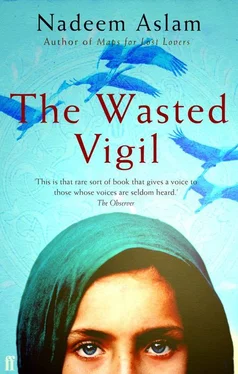Nadeem Aslam - The Wasted Vigil
Здесь есть возможность читать онлайн «Nadeem Aslam - The Wasted Vigil» весь текст электронной книги совершенно бесплатно (целиком полную версию без сокращений). В некоторых случаях можно слушать аудио, скачать через торрент в формате fb2 и присутствует краткое содержание. Год выпуска: 2009, Издательство: Faber and Faber, Жанр: Современная проза, на английском языке. Описание произведения, (предисловие) а так же отзывы посетителей доступны на портале библиотеки ЛибКат.
- Название:The Wasted Vigil
- Автор:
- Издательство:Faber and Faber
- Жанр:
- Год:2009
- ISBN:нет данных
- Рейтинг книги:4 / 5. Голосов: 1
-
Избранное:Добавить в избранное
- Отзывы:
-
Ваша оценка:
- 80
- 1
- 2
- 3
- 4
- 5
The Wasted Vigil: краткое содержание, описание и аннотация
Предлагаем к чтению аннотацию, описание, краткое содержание или предисловие (зависит от того, что написал сам автор книги «The Wasted Vigil»). Если вы не нашли необходимую информацию о книге — напишите в комментариях, мы постараемся отыскать её.
The Wasted Vigil — читать онлайн бесплатно полную книгу (весь текст) целиком
Ниже представлен текст книги, разбитый по страницам. Система сохранения места последней прочитанной страницы, позволяет с удобством читать онлайн бесплатно книгу «The Wasted Vigil», без необходимости каждый раз заново искать на чём Вы остановились. Поставьте закладку, и сможете в любой момент перейти на страницу, на которой закончили чтение.
Интервал:
Закладка:
A recording he himself had made two decades ago — of the long lifting notes from the throat of a red-vented bulbul, the bird known as Asia’s nightingale — was followed by Bach and then American jazz.
‘Duke Ellington visited Afghanistan,’ he would tell Lara when she came to the house. ‘He performed in Kabul in 1963.’
‘The year of my birth.’
‘And my daughter’s.’
He worked in the garden, or, book in hand, sat on the threshold where there grew five cypress trees as tall as a house fire, or he wetted a small piece of cloth in warm water and carefully lifted away the earth smeared onto the men and women on the walls, layer by patient layer, taking three hours to uncover the arm entwined around the stem of a small-blossom-laden tree. A red vein in a petal, like a mild thrill. Rubbing off the thick crust from the woman’s wristband he discovered an emerald painted underneath. He felt like a gem miner. He thought about David Town, the American dealer in gemstones his daughter had loved in the months before she died. He wondered how long it had been since David last visited him.
Carrying a lantern in his only hand, he went along the path enclosed within the Persian lilac trees. The perfume factory he had built soon after buying the house was in that direction, women and men coming from Usha to work there, harvesting the acre of flowers from the adjoining fields. It now stood disused and he let himself in, his feet rustling the dry leaves on the floor. Crossing the small office he carefully began to descend the long staircase that was a funnel of trapped warmth.
The factory had to be below ground for the coolness and the softer light to help preserve the ingredients. And soon after the digging work began, they had encountered a large boulder, an indentation at the top of the mass the first thing to come into view, a hollow no bigger than the clay bowls in which Marcus cultivated the ferns of Nuristan. As they worked away the earth, a slender ridge was found snaking around the small depression, and then they saw that the whole was in fact a large human ear. Continuing downwards and around the mass, they understood that they were excavating the head of a great Buddha, lying on its side. Vertically it measured ten feet from one ear to the other. Horizontally it was fifteen feet from the topknot to the decapitated neck.
A face from another time.
Though he knew that this province was one of the most important pilgrimage sites in the Buddhist world from the second to the seventh centuries AD — over a thousand Buddhist stupas in the area echoing to the incantations of monks back then — Marcus would never learn when this particular statue had been buried or why. Too heavy to move, he decided to continue with his plans for the factory with the head in it. It lay on the floor and into the wide rectangular space that they cleared around it they constructed work stations and storage areas and shelving.
Eyes two-thirds closed in meditation. The smile of serenity. The large dot between the eyebrows, perfectly circular like a guitar’s round mouth. The head covered entirely in the incised ripples of hair. Marcus journeyed around him now, his sleeve absorbing warmth from the hot glass of the lantern. A stone stillness. He wondered if the rest of the body was buried near by, whole or fragmented.
The place was dusty. In the air lit by the bud of flame there were countless motes as though fur dislodged from a clash of moths. Under the staircase there were cages in which Nepalese civet cats were once kept — three ferocious blue-and-white felines, the buttery secretions scraped from whose perineal glands were a prized fixative for perfume.
Bracing his arm against the stone mouth he bent down to retrieve a small vial of glass from the floor. So much destruction and yet this had survived. A four-line poem in Dari was etched on it. He removed the stopper the size of a lark skull and sniffed it, remembering that containers discovered in Egyptian tombs were still fragrant after three thousand years.
*
Where was Zameen on the night the Soviet soldiers came to the house? Marcus wouldn’t know the answer to this question until he met David Town many years later.
She would disappear from Marcus’s life but enter David’s at a point farther down the line, and then, time moving on, David would meet Marcus. How stories travel — what mouths and what minds they end up in .
The girl had slipped out of the house in the darkness when a pebble was thrown against her window pane, the sound like a bird’s beak accidentally striking the glass. A boy in the garden. She went with him along the lake, towards Usha. She was unafraid of the djinn, Marcus and Qatrina having taught her to quietly disregard the many rumours about that place — quietly, undemonstratively, because Marcus with his outsider’s nerves did not wish to injure anyone’s sensibilities.
Just the previous week a man was said to have trapped a green bee-eater and taken it to his bride, but the pious girl who was versed in all seven branches of Islamic knowledge had veiled her face immediately, exclaiming that that was no way for an honourable husband to behave, bringing a stranger into the presence of his wife. She explained that the bird was in fact a human male who had been given his current form by the djinn.
Zameen and the boy were in the demon-strewn expanse of trees when they saw the cleric of the Usha mosque, a torch burning beside him. He was a powerfully built man in his late thirties who had four wives, the maximum simultaneous number allowed to a Muslim. His back was towards Zameen and the boy, and they were about to change direction when he looked over his shoulder. Later she would think the perfume she was wearing on her skin had reached him. But the disturbed soil from the grave he was digging must have released much stronger odours. Their eyes met, and then the two young lovers turned and hurried away, ran, unsure of whether or not they were being pursued.
They knew what he was doing, because he had done it before.
Soon after buying their house, Marcus and Qatrina had learned that the myth of the djinn was only a decade or so old, dating from around the time the cleric’s eldest wife — a woman in her forties who had pulled him out of poverty — had vanished. That was when he began insisting that the area around the lake was a nest of malevolent beings, forbidding anyone from venturing there. He married a thirteen-year-old within a month of the disappearance. His insistence proved to be a great problem for Marcus and Qatrina who would have liked their home to serve as their surgery and clinic. But virtually nobody from Usha, no matter how ill, was willing to brave the journey because the spiritual leader had forbidden it. Qatrina and Marcus had to acquire two small rooms in Usha and drove there every morning. The cleric was to prove just as intractable when Marcus began thinking about the perfume factory, but he changed his mind when Marcus offered to produce the sat-kash rose perfume for him: the extract of the best blossoms was distilled seven consecutive times to produce this, and the very few people who could afford it took it with them to Arabia to sprinkle on Muhammad’s grave. An immense honour. The cleric agreed to issue talismans to the workers of the perfume factory, to protect them on their journey towards Marcus’s house, providing they kept to the one main path along the lake. Later he began to issue them to the very desperately ill also, warning them in no uncertain terms that they must not stray.
All her life, Zameen had heard Marcus and Qatrina air various theories about the djinn, but it was always obvious to them that the missing wife was interred there.
And now Zameen herself had proof.
The two of them emerged on the path along the lake, the water so placid tonight it could have reflected even the thinnest of the moon’s fourteen faces. Seeking reassurance, she stretched her hand in the darkness until it was pressed against the boy’s face. At one time there would have been thin silk between the palm of her hand and his features. So great had been his beauty a few years ago that, fearing abduction, his parents had confined him to the house. A second Joseph, a second Yusuf, he was draped in diaphanous material if ever he was allowed into the street. There had been several attempts to seize him, the house shaken by the ferocity and the organised nature of some of the assaults.
Читать дальшеИнтервал:
Закладка:
Похожие книги на «The Wasted Vigil»
Представляем Вашему вниманию похожие книги на «The Wasted Vigil» списком для выбора. Мы отобрали схожую по названию и смыслу литературу в надежде предоставить читателям больше вариантов отыскать новые, интересные, ещё непрочитанные произведения.
Обсуждение, отзывы о книге «The Wasted Vigil» и просто собственные мнения читателей. Оставьте ваши комментарии, напишите, что Вы думаете о произведении, его смысле или главных героях. Укажите что конкретно понравилось, а что нет, и почему Вы так считаете.












